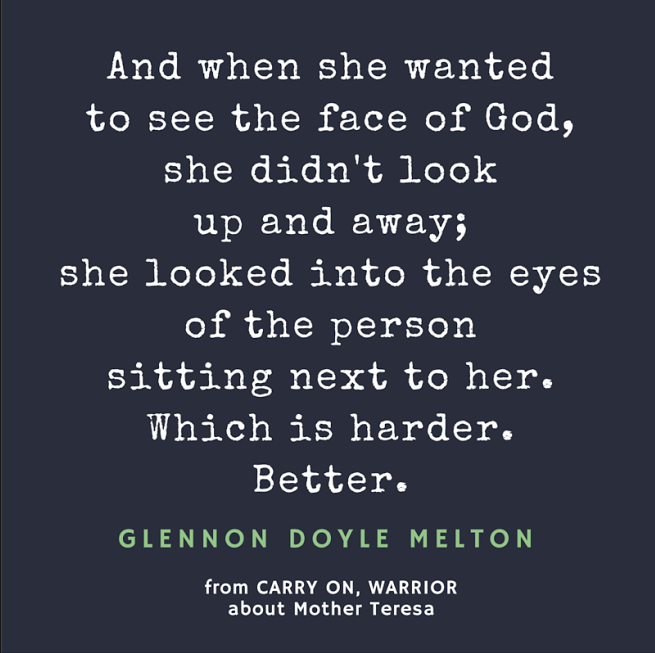
I am thinking about what faith asks of us. I think I can find a beginning place in the words kindness, faithfulness, gentleness, self-control, all listed in Galatians 5:22-25. The Galatians passage is certainly a good measuring instrument for living our faith, but there is one specific, and very important, thing our faith demands.
Our faith asks us to find the face of God in every person. Every person. Doing this is not easy. Any of us can be self-absorbed at times. We can be exclusive, engaging with only the people we prefer in our circles of friends. We can be high-reaching, choosing to see only those who can increase our status. We can be too busy to truly see another person.
Most troublesome for us is the tendency to demonize people who don’t fit into our preferred theology, our accepted social mores or our politics. The current social and political climate certainly plays with our sense of right and wrong. When we hear dehumanizing rhetoric every time we tune in to television news, we lose just a bit of our own humanity. When we hear our political leaders dehumanizing one another for the sake of their own political agendas, we become just a bit more accustomed to words that hate and harm. We can almost become comfortable with words and acts and images that dehumanize persons.
In this environment, it is always possible to cross an invisible moral line, even inadvertently. Perhaps we are in danger of also crossing the line of faith and thereby betraying our humanity.
Certainly, I am not advocating that we leave our courage at the door when we confront power brokers intent on harming people. On the contrary, I am saying that when dehumanization is occurring, when oppression is bringing harm to vulnerable people, this is where we speak from the core of our faith.
From the core of our faith, we must stand against dehumanizing rhetoric that promotes xenophobia, homophobia, racism, mysogyny and any ideology that vilifies the “other.” From the core of our faith, we must create open spaces for all persons with full respect to racial, sexual gender and ethnic identities. From the core of our faith, we must approach with open arms all persons with varying abilities, economic status, social standing and age. From the core of our faith, we must see in every person the face of the Creator.
In her blog, Brené Brown writes about the great harm inflicted by dehumanizing rhetoric and images. She says that dehumanizing starts with language, and she gives us a warning about speaking or acting in ways that harm others. She days, “When we desecrate their divinity, we desecrate our own, and we betray our humanity.”
That means that, even in the presence of the words and acts of dehumanization we witness every day, our faith compels us to see the face of God in every friend, every stranger, every enemy, even in people with whom we most vehemently disagree.
Brené Brown describes the line we must not cross, and she describes the dire consequences of crossing it:
There is a line. It’s etched from dignity. And raging, fearful people from the right and left are crossing it at unprecedented rates every single day. We must never tolerate dehumanization—the primary instrument of violence that has been used in every genocide recorded throughout history.
As people of faith, we have our mandate. People of faith — people of every faith — must always lean into grace, cherishing the humanity of every individual, seeing the face of God in every person. To encourage and inspire, I leave you with a portion of a prayer published by Reverend Dr. Whit Bodman, former Associate Professor of Comparative Religion at Austin Seminary.
O Beloved of the Beloved, what can we say to thee?
We are as we are . . .
Seldom having sought thee seriously;
Seldom having listened to thee earnestly;
Seldom having followed thee faithfully . . .
We are as we are.
Enter us, O spirit of power and gentleness.
Astonish us. Overcome us. Uproot us.
We are as we are, but not as we can be.
Bend us toward one another — Jew, Baha’i, Muslim,
whatever the shape of our faith.
Lift us beyond the terror of difference to the delight of difference.
Nourish us now on this sweet fare of our neighbor’s words and smiles,
for in them is a taste of the feast that is to come,
once we are no longer as we are.
Amen.
And amen.
May God make it so.

A so well reasoned argument that I can save and share and I was amazed that I had never come across the whit Bodman prayer before.
LikeLike
Such a beautiful prayer. It was included in a recent issue of the Austin Theeological Seminary’s faculty journal. It was a tribute to Whit Brodman
LikeLike
The importance of seeing God in every person cannot be emphasized enough. He loves everyone and so should we. Your writings are an inspiration and encouragement to me. Thank you.
LikeLike